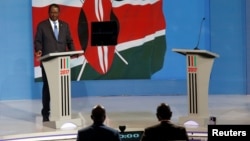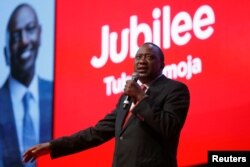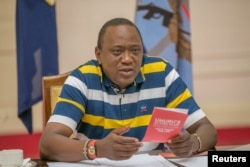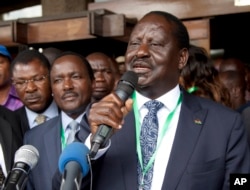With just two weeks to go before Kenya’s elections, the nation watched the lead opposition candidate for president, Raila Odinga, debate solo Monday after his top opponent, President Uhuru Kenyatta, refused to show for the live event.
Opposition leader Raila Odinga had the stage to himself for the televised presidential debate. He responded to questions from the two moderators for 90 minutes.
“I am running here because of my commitment to change this country. I represent change,” he said.
Odinga promised to address the rising cost of living, and to fight corruption ban those in government from doing business with his administration. He said the current government is over-borrowing on large infrastructure projects. His challenges went unanswered.
No-show
The podium for his opponent, President Uhuru Kenyatta, stood empty. Kenyatta’s team said he would not attend the debate because they were not happy with the format and rules.
Kimani Ichung’wa is a member of parliament from central Kenya. His party is part of Kenyatta’s Jubilee Coalition.
“We have told you we need you to lay out this debate a certain way that will be fair to everybody and will accord Kenyans opportunity to be able to decide on the basis of issues, not personality size. Not inflaming emotions, political emotions in a country where political emotions are very high at the moment. On account of that principle, the organizers ignored and refused because they had ulterior motives,” said Ichung’wa.
The presidency released a statement Tuesday saying the president would engage with Kenyans directly, including plans to speak to an additional 40 radio stations before the vote.
Three of the other six presidential candidates debated during the first half of the event.
Tight race expected
This is the fourth time Odinga is running for the top job. The race is expected to be tight, though it is not clear what impact the debate would have on voters.
Identity politics remains the norm in Kenya with ethnicity and regional loyalty governing people’s choices at the polls, what Odinga called during the debate “a homeboy mentality.”
But there are some undecided voters, as much as five percent of the electorate, according to recent polls done by InfoTrack and Synovate. Those undecided voters were Odinga’s target Monday, says Kenyan political commentator Barrack Muluka.
"The government missed an opportunity to state its position, to call the bluff in what these people were saying, and to show where the weaknesses and failures in these people’s thoughts are, if any,” he said.
There were no major revelations in Odinga’s statements during his solo debate. He pledged to respect the results of a free, fair and credible election.
Kenyans go to the polls August 8.







